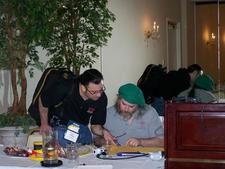USENIX Tips for Admins: Virtualization and HPC Don't Go Together
At the USENIX LISA conference in San Diego, Lee Damon and Mike Ciavarella presented a foundation workship as a tutorial for admins with tips and tricks for working efficiently. The presentors didn't agree on all points, but one commonality was that they advised against running High Performance Computing (HPC) together with virtualization.
Virtualization was one of the main themes at the California conference, where workshops on the subject ranged from the open source Hypervisor Xen and virtualization with VMware ESX Server to a training session for programming virtual infrastructures. All this information prompted Damon and Ciavarella to warn against making rash decisions without first thoroughly testing a solution. Damon came up with a study in point. As sysadmin at the University of Washington, he has been maintaining huge clusters with HPC. Although he doesn't doubt the usefulness of virtualized systems, he feels that combining them with HPC can be problematic. His Australian colleague Ciavarella concurs in that he has had similar experience at the University of Melbourne.
In their often entertaining presentation, the two colleagues waxed skeptical in general about some of the new fashions in IT. One example is the iPod, which they observed some sysadmins using even as a backup solution. Damon cited another example where a sysadmin asked him for advice how he could reduce his workload, admitting that he often put in 120-hour weeks. This overtime was mainly because of downloads and patch updates for the countless open source applications he needed to administer. The response from Damon and Ciavarella was "Think of it, free software isn't necessarily free, even with no licensing fees. It costs labor hours!" On the one hand not all updates make sense. On the other, it might be best to calculate whether commercial support contracts easily offset working time best used otherwise. In the experience of the two presentors, many sysadmins forgo this calculation in favor of existing support contracts.
The overall consensus was that working time is a major issue among sysadmins, who even during the conference were incessantly juggling laptops, beepers and cell phones. Many of the tips that came out of this tutorial revolved around this issue and documentation was presented as one major bit of help. In fact, Ciavarella is dedicating another tutorial Wednesday on the subject with the title "Documentation Techniques for Sysadmins."
The streaming video of the LISA'08 conference is available at a cost from here.
Subscribe to our Linux Newsletters
Find Linux and Open Source Jobs
Subscribe to our ADMIN Newsletters
Support Our Work
Linux Magazine content is made possible with support from readers like you. Please consider contributing when you’ve found an article to be beneficial.

News
-
LibreOffice 26.2 Now Available
With new features, improvements, and bug fixes, LibreOffice 26.2 delivers a modern, polished office suite without compromise.
-
Linux Kernel Project Releases Project Continuity Document
What happens to Linux when there's no Linus? It's a question many of us have asked over the years, and it seems it's also on the minds of the Linux kernel project.
-
Mecha Systems Introduces Linux Handheld
Mecha Systems has revealed its Mecha Comet, a new handheld computer powered by – you guessed it – Linux.
-
MX Linux 25.1 Features Dual Init System ISO
The latest release of MX Linux caters to lovers of two different init systems and even offers instructions on how to transition.
-
Photoshop on Linux?
A developer has patched Wine so that it'll run specific versions of Photoshop that depend on Adobe Creative Cloud.
-
Linux Mint 22.3 Now Available with New Tools
Linux Mint 22.3 has been released with a pair of new tools for system admins and some pretty cool new features.
-
New Linux Malware Targets Cloud-Based Linux Installations
VoidLink, a new Linux malware, should be of real concern because of its stealth and customization.
-
Say Goodbye to Middle-Mouse Paste
Both Gnome and Firefox have proposed getting rid of a long-time favorite Linux feature.
-
Manjaro 26.0 Primary Desktop Environments Default to Wayland
If you want to stick with X.Org, you'll be limited to the desktop environments you can choose.
-
Mozilla Plans to AI-ify Firefox
With a new CEO in control, Mozilla is doubling down on a strategy of trust, all the while leaning into AI.

